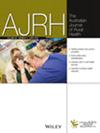A qualitative exploration of the role of a palliative care pharmacist providing home-based care in the rural setting, from the perspective of health care professionals
Abstract
Introduction
Pharmacists are often not recognised as a core part of palliative care teams, despite their ideal placement to assist with the burden of medication management.
Objective
This study explored the role of pharmacists working in the rural palliative care team, in the home-based setting.
Design
Health care professionals working with palliative care patients in rural South Australia participated in semi-structured interviews. Data were analysed using thematic analysis.
Findings
Data from 20 participants identified 10 themes. Theme 1: This model of care gives patients a choice. Theme 2: The pharmacist is a trusted source of support and information. Theme 3: Patient, carer and family distress is reduced. Theme 4: Enables patients to stay at home by improving medication knowledge and decreasing burden; 4.1—Patient, carer and family's understanding about medication management is improved, 4.2—Patient, carer and family travel is decreased, 4.3—Burden associated with getting to the doctor is decreased. Theme 5: Communication between all parties is enhanced; 5.1—Enhanced communication between the patient and health care team, 5.2—Enhanced communication within the health care team. Theme 6: Patient, carer and family burden of coordinating prescriptions and medications is reduced. Theme 7: Benefits health care professionals by improving medication knowledge, reducing workload and stress; 7.1—Understanding about medications and their management is improved, 7.2—Workload is reduced, 7.3—Work-related stress is reduced. Theme 8: The disparity of care between rural and urban patients is reduced. Theme 9: Helps to address rural workforce shortages. Theme 10: Challenges of this model of care; 10.1—A need for greater pharmacist capacity to meet demand, 10.2—A need for increased and sustained funding for the pharmacist role, 10.3—Large amount of travel to get to patients.
Conclusion
Rural health care professionals are supportive of pharmacists working as part of the palliative care team in home-based settings and identified many benefits of this model of care.

 求助内容:
求助内容: 应助结果提醒方式:
应助结果提醒方式:


